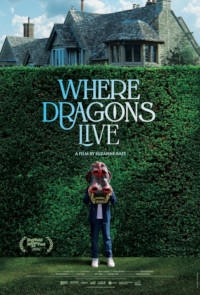| SHADOWS ON THE WALL | REVIEWS | NEWS | FESTIVAL | AWARDS | Q&A | ABOUT | TALKBACK | |||||||||||||||||||||
 Shadows off the beaten path Shadows off the beaten pathIndies, foreign, docs and shorts...
On this page:
THE EXTRAORDINARY MISS FLOWER |
WHERE DRAGONS LIVE |
WIND, TIDE & OAR
| |||||||||||||||||||||
| See also: SHADOWS FILM FESTIVAL | Last update 30.Apr.25 | |||||||||||||||||||||
|
The Extraordinary Miss Flower Review by Rich Cline | 
| |||||||||||||||||||||
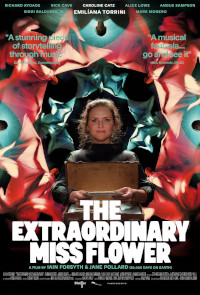 dir Iain Forsyth, Jane Pollard scr Stuart Evers prd Zoe Flower with Emiliana Torrini, Caroline Catz, Alice Lowe, Richard Ayoade, Nick Cave, Niall Murphy, Angus Sampson, Siggi Baldursson, Mark Monero, Kate Coyne, Viva Seifert, Saeed Esmaeli, Sophie Ellis-Bextor, Simon Byrt, Liam Hutton, Mara Carlyle, Ian Kellett, Lovisa Elisabet Sigrunardottir release UK 9.May.25 24/UK 1h13  Now streaming...
| 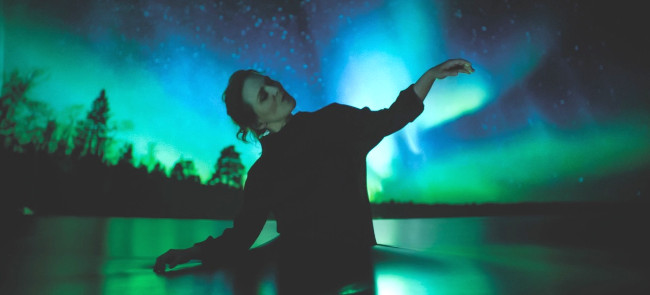 Defying genres, this warm and enjoyably kaleidoscopic film centres around musical performances as it explores the story of a woman's secret romantic life, revealed through letters that were written to her. Filmmakers Iain Forsyth and Jane Pollard, working with Icelandic musician Emiliana Torrini, have created a wonderful outburst of creativity stemming from an unexpected source. It's a mesmerising film, with hypnotic songs that echo a life of passion. After producer Zoe Flower discovers a suitcase full of old letters written to her late mother Geraldine, her friend Torrini finds them to be the inspiration she needed to write songs for a new album. The film features sublimely staged performances of these songs, with Torrini's band appearing alongside her. These are interspersed with cheeky scenes in which Catz plays Geraldine and various actors play her lovelorn correspondents. There's also a 1960s-style narrator (Lowe) who fills in the previously untold story of this ordinary woman who lived a very romantic life between England and Australia. Visually gorgeous, the film's flurry of imagery coalesces into a story that's infused with whimsy. Catz's knowing performance is wry and funny, especially when she's interacting with the curious, mischievous Torrini. Visually, the song sequences resemble arthouse music videos that are punctuated with mini-dramas featuring various amorous suitors pining over Geraldine. And these are positioned alongside terrific personal snapshots and archival clips from the period, creating a groovy, soulful vibe that matches Torrini's songs. Forsyth and Pollard are gifted at creating lushly designed films that blur lines between music, drama and art. And because this one centres on the lost art of letter-writing, it has both an important nostalgic kick as well as an unusually powerful sense of longing across vast distances. There's also a masterstroke in the end, as Torrini finally finds a letter written by Geraldine, allowing her to stir Miss Flower's distinctively lusty, poetic voice into the rather heady mix. Yes, this is a film to savour on several levels.
| | |||||||||||||||||||
|
Where Dragons Live Review by Rich Cline | 
Now streaming...
| 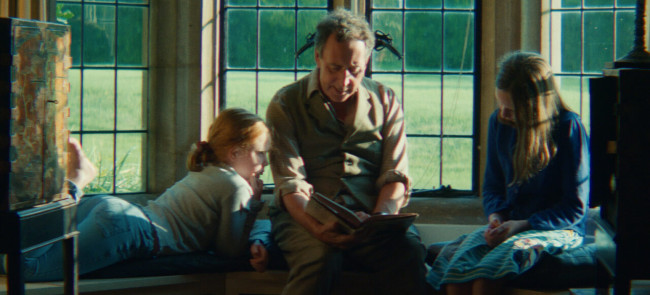 Beautifully shot and edited to convey a vivid imagination, this gently paced documentary traces the life of a family in rural England. This warm, involving film explores the nature of inheritance and memory, creating skilful new footage of intriguing discoveries while seeing the past through an array of artefacts, snapshots and home movies. It's a fascinating look at both Britain's distinct middle-class culture and a singular family dynamic. In Oxford, Harriet returns to her large, extremely lived-in childhood home after the death of her parents, reviving an almost overwhelming number of memories. Playing in the vast gardens, the grandchildren speak about how they always felt this place looked haunted. Harriet's big brothers Edward, Lawrence and Matthew have their own perspectives, and feel the pull of their past when they step into this house, which is directly connected to a famed painting of St George and the dragon. And their childhood was infused with their father's lively lore about dragons living in the grounds. Details fill the screen, sifting through the wonderful clutter that's packed into each room, including lots and lots of dragons in various forms of artwork. Harriet recalls all of the rules her mother had, which are noted all over the house and have bled into how she runs her own family. The kids note that their grandmother wasn't good with children, but they know she loved them. Sorting through a houseful of things is magical, but also of course painful, as they can't keep everything that has meaning. Indeed, the house itself is integral to their sense of identity. The siblings speak about how they lived isolated from the nearest village, recognising that they had a privileged childhood in this fantastical place, even as each had their own personal challenges. There are also references to their fearsome mother as a fire-breathing dragon. Stated early on and running through everything is the idea that everyone is afraid of death, time is ticking. This feeds into discussions about the nature of world-wide dragon mythology, that they were created as an amalgam of things our ancestors feared. This is a moving, involving little doc that will spark personal memories for each person watching it.
|
| Wind, Tide & Oar Review by Rich Cline | 
| 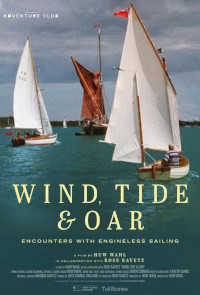 dir Huw Wahl prd Huw Wahl, Rose Ravetz with Rose Ravetz, Stevie Hunt, Jonathon Bailey, Giles Gilbert, Richard Titchener, Hilary Halajko, Oliver Evans, Elte Rauch, Jorne Langelaan, Andreas Lackener, The Brickhill Family release UK 25.Apr.25 24/UK 1h24 Now streaming...
| 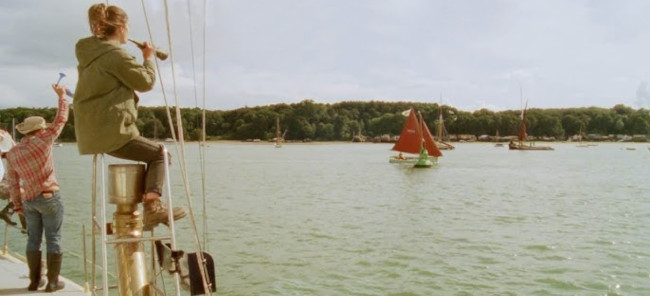 Subtitled "Encounters With Engineless Sailing", this relaxed, entertaining documentary celebrates traditional methods of seafaring without any mechanical assistance. Filmmaker Huw Wahl pointedly shoots this on gloriously grainy 16mm film in a fly-on-the-wall style, observing real-life sailors who prefer to embrace thousands of years of human skill rather than modern machinery. It's filmed with a wonderful attention to detail in glorious locations, and each moment is accompanied by fascinating observations. After watching a small boat negotiate with an enormous cargo ship, we see producer Rose removing her boat's propeller. She and other serious sailors who have rejected engines are captured on lively days out with friends. Often sailing as family groups, children dive into the work of keeping the boat moving with wind and tides. Of course, this often requires quite a lot of effort, but they clearly relish both the challenges and the skills they have so carefully honed. And they know their boats and the sea far more than fair-weather, motor-powered sailors do. The film embraces ironies like trucks towing these boats to the waterfront, where mechanised cranes hoist them into a river and motorboats tow them out to sea. But once in the open, the silence is only punctuated by human voices and the rattle of sails being raised and lowered. They're continually told off for breaking rules, like sailing through locks on wind power. But their curiosity and sheer enjoyment are seen in everything they do, including activities like fishing or collecting oysters. And they understand the complex bigger picture as it relates to corporate profits and environmental damage. Rosie rejects attempts to overanalyse her lifestyle; sailing like this makes her feel more at home in the world. It's clear why these sailors want to be at one with nature, for example as they glide with a pod of dolphins, and they are also more connected to ancient human history. Beautifully photographed and edited, there is an added visceral sensibility in shots of bare feet on boat decks and hands manipulating ropes and oars. This isn't about rejecting technology, it's about maintaining their independence. And watching them is like a balm for even a landlubber's soul.
| 
See also: SHADOWS FILM FESTIVAL © 2025 by Rich Cline, Shadows
on the Wall
HOME | REVIEWS | NEWS | FESTIVAL | AWARDS
| Q&A | ABOUT | TALKBACK | | ||||||||||||||

